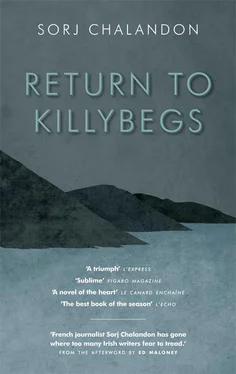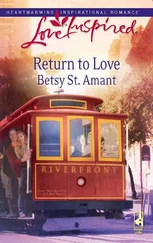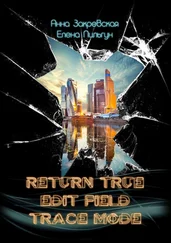— Lord spare us! my mother cried, pressing her cheek against baby Sara’s.
At the end of the street there was a huge explosion, a white burst of flame flowered in the chapel where we were going to take shelter. The sound of war. Real, staggering. The storm of men. The crowd was in chaos, suddenly on the ground, thrown, knocked down, heaped in screaming disorder along the walls. Some of them died where they stood, open-mouthed. Others collapsed helplessly.
We formed a ring of fear, our backs to the danger. Lawrence knelt down, Mother and the wee ones in the centre. Seánie, Róisín, Mary, my uncle and I were protecting them. We were wrapped around one another, heads pressed together and eyes closed.
— Don’t look at the flashes, they’ll blind you! screamed a woman.
We repeated the Hail Mary, faster and faster, tearing through the words. We were repenting. Mother was no longer praying, she had abandoned that familiar peace. Rosary wrapped around her wrist, a bracelet of beads, she was screaming at Mary the way you howl at the moon. She was calling out for her to protect us in the middle of the inferno.
We were never able to reach the O’Neill factory with its enormous basement. We stayed where we were until the war grew weary. The planes went away, disappeared behind the black mountains. And we returned amid the rubble. Our street was intact. Houses were burning just behind it. The entire northern section of the city had been demolished.
— The Protestants got what they deserved, growled a guy as he looked at the red and black sky above York Street.
— You think the Jerries can tell the difference? a neighbour asked.
The guy looked at him angrily.
— What’s bad for the Brits is good for us!
It was four in the morning. Everything stank of acrid fire. With the help of the Blessed Virgin, Mother put her wee ones to bed. She was speaking to her, thanking her in a low voice. My mother’s face: dreadful tears, smeared with snot and foamy saliva, hair tumbling. She pleaded with her. She should no longer turn away from our family. She needed to be there, always. Okay? Promise? Promise me, Mary! Promise me!
Lawrence took his trembling sister by the shoulders and folded her into his chest.

In the morning, I walked with Seánie and my uncle through Belfast for the first time in my life. The silence was shattered, the city turned upside down. All around you could hear the sound of glass, of shifting steel, fallen rubble. We stumbled amongst the blocks, the piles of bricks, the wood ripped away from timber structures. Beams blocked off avenues, lying between electricity poles and tram cables. The post-catastrophe dust lay over everything. White and grey smoke, fire flickering beneath the ruins. At the centre of vacant lots, bombs had hollowed out craters that were now filled with muddy water. We came across a car engulfed by a fountain of street. Men were wandering around, hands black, sooty faces, trousers and coats covered in ash. Others were standing at crossroads, beyond alone, speechless, their gaze devastated. There were very few women about. We heard the occasional uneven clopping of a horse passing, or a wheelbarrow. The locals clattered along on bicycles, matching the rhythm of the surrounding cacophony. Some students were standing in front of a building whose facade was missing, shovels in their hands. Four of them in medical-faculty uniform were carrying a wounded person.
And then I saw my first casualty of war, a few feet away. One arm was sticking out from under a blanket on a stretcher that lay on the ground. A woman’s arm, her nightdress melted onto her flesh. Seánie put a hand over my eyes. I shook him off.
— Let him look, my uncle told him.
I looked. The arm of the woman, her hand with its painted nails, skin hanging from the elbow to the wrist like a torn sleeve. We passed very close to her. The shape of the head underneath the fabric, her chest and then nothing, the blanket sagged from around the level of her waist. No legs left. In the street a newspaper vendor was selling the Belfast Telegraph . He was yelling about the hundreds dead, the thousand wounded. As for me, I saw an arm. I didn’t cry. I did the same as everyone else who passed. I touched my index and middle fingers to my forehead, chest, left shoulder, right shoulder. In the name of the Father and all the others. I decided to no longer be a child.

On Jennymount Street there was a man playing the piano, sitting on a wooden chair. The instrument had been rescued from the blaze and pulled outside, with its film of ash and debris. A few children had drawn near, their mothers with them, and some soldiers, too. I knew that song. I’d often heard it on Irish radio. ‘Guilty’, a love song.
If it’s a crime then I’m guilty, guilty of loving you…
The musician was making faces. Winking. He was imitating Al Bowlly, the Killybegs girls’ favourite singer.
— Pity he isn’t Irish, my mother had said one day.
— Good job he isn’t, my father had responded.
And he would turn the dial on the radio that sat on the counter of Mullin’s. It was a game they played. My father would have challenged Bowlly at singing if he could, him with his gravelly voice, Bowlly with his honey.
— The voice of a eunuch, Padraig Meehan used to say.
He was wrong, and he knew it. But nothing British was allowed to offend our ears. Neither order nor song.
London was bombed two days after Belfast, on 17 April. Al Bowlly died in his home, blown up by a parachute mine. His ballad was aired on the BBC as a funeral hymn.

In front of a gutted house on the Crumlin Road, a crowd was gathered around several firemen. They weren’t wearing firemen shoes and their coats were drenched by the fire hoses.
— Those are Irishmen from Ireland! a man shouted.
Their captain was giving curt orders. I immediately recognized an accent from my country. I saw the Dublin Fire Brigade truck. Irishmen. Thirteen fire brigades had crossed the border in the morning, from Dundalk and Drogheda, too. The residents were offering them coffee and bread. Irishmen. I went closer. I wanted everyone to know that they were from my country. Each time a passer-by joined the crowd I would tell them the good news. The Irish had come to help. I could see the border soldier with his blond moustache and his thin lips. I replayed the scene.
— Have you come to fight the Jerries?
— You bet!
An old woman arrived with her arms in the air like a prisoner. She had mistaken the Dublin accent for a German one. She was removing debris from her house. She was groggy, covered in soot and bits of plaster. When people pointed out the Irish fire engine she sat down on the pavement, shaking her head, convinced now that the blast of the bombs had thrown her to the other end of the country.
The crowd was spilling into the street. A few soldiers broke it up. They pushed a journalist from the Belfast Telegraph away and confiscated his camera. Ireland was neutral and its presence here, assisting a combatant country, even just fighting fires, could embarrass the Irish government. Our firemen went back across the border the same day.
Our sadness turned to anger. I listened to the crushed city, the fragmented discourse. ‘I never did like washing the windows. Now I’ve a good reason not to do it any more,’ a shopkeeper had written on his cracked shop window. At the corner of Victoria Street and Ann Street, perched on a breeze block, a man was shouting that Northern Ireland was unprotected. That even the least important English town had shelters, anti-aircraft defences, troops, real fire services.
Читать дальше













